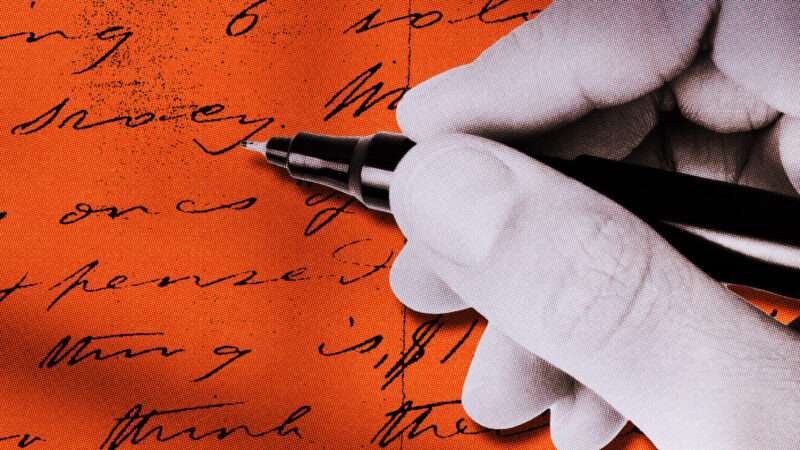
Georgia prosecutors in different jurisdictions are using defendants' speech and writings as evidence in racketeering cases, a move that could have terrible ramifications for the First Amendment.
Congress passed the Racketeering Influenced and Corrupt Organizations (RICO) Act in 1970; more than 30 U.S. states, including Georgia, have passed their own versions in the years since. Nominally intended for use against criminal organizations like the Mafia, RICO statutes allow prosecutors to charge a large number of defendants by demonstrating that they are all part of a single criminal enterprise.
Prosecutors in Georgia are currently involved in three different high-profile RICO cases: the state attorney general's case against 61 protesters who oppose the construction of a police training facility; Fulton County District Attorney Fani Willis's prosecution of former President Donald Trump over attempts to overturn the results of the 2020 election; and Willis's case against alleged gang members, including rapper Young Thug, which began this week after a ten-month jury selection process.
In the latter case, prosecutors allege that the rapper—born Jeffery Williams—was a founding member of the criminal street gang YSL, which is said to have committed numerous violent crimes over the previous decade, including murder, assault, and armed robbery. The indictment refers to YSL as a criminal enterprise and lists numerous "overt acts in furtherance of the conspiracy," including the lyrics to a number of songs: The indictment cites Williams' appearance in music videos for songs with lyrics like "I killed his man in front of his momma" and "I get all type of cash, I'm a general."
Earlier this month, Fulton County Superior Court Chief Judge Ural Glanville ruled that prosecutors would be allowed to present lyrics as evidence at trial.
Last year, Willis defended the practice of using lyrics as evidence, saying "If you decide to admit your crimes over a beat, I'm going to use it." She further pledged that "you do not get to commit crimes in my county and then decide to brag on it, which you do as a form of intimidation, and not be held responsible."
The practice is controversial. After Williams' indictment, numerous music industry stakeholders—including Warner Music Group, Sony Music Group, and Universal Music Group, as well as organizations like SoundCloud, Spotify, and the American Civil Liberties Union, plus multiple legal scholars and musicians—signed an open letter calling for an end to the use of rap lyrics as evidence in criminal trials. The signatories called the practice "un-American and simply wrong," constituting "an obvious disregard for free speech and creative expression protected by the First Amendment."
In 2014, Damon Root wrote in Reason that "the First Amendment plainly includes the freedom to write about violent, gruesome, and offensive things without facing legal persecution for having done so."
Meanwhile, in the case against several dozen activists who oppose a police training facility, prosecutors are trying to use a deceased protester's diary as evidence.
In January 2023, Manuel Esteban Paez Terán was shot and killed by police who were clearing protesters from a forest encampment. While law enforcement officials claim Paez Terán shot first, the county medical examiner was unable to find gunpowder residue on the activist's hands.
Earlier this month, Georgia Deputy Attorney General John Fowler filed a motion seeking to use Paez Terán's diary, which was allegedly found at the scene, as evidence in the RICO trial. "The diary entries consist of violent anti-police rhetoric and drawings, notes on meetings in the forest, to do lists regarding various tasks including committing crime, philosophical musings about the tyranny of government, and other personal writings," Fowler notes. The motion calls Paez Terán a "co-conspirator" whose statements are therefore admissible as evidence.
The diary does contain numerous references to violence, including against both police officers and police property. But as The Guardian notes, "only about a dozen of the diary's 150 or so pages were written while the activist was camped in protest against the training center at a public park near the project's planned site, and none of those pages contains such material."
Indeed, the vast majority of the diary was written in 2021, long before the events of the current protest movement.
Besides, just as with rap lyrics, using a person's diary as evidence in a criminal trial stands in direct contrast to the principles enshrined in the First Amendment. And the content of one's personal diary has little bearing on their outward actions. Diaries, after all, are not a mission statement; they are a repository for one's private thoughts not meant to be shared with the public.
Lyra Foster, an attorney representing three defendants, told The Appeal, "A young person's meandering thoughts put into writing will never be evidence that proves guilt beyond a reasonable doubt and is a desperate media stunt."
The post Prosecutors Use Lyrics, Diary Entries as Evidence in Georgia RICO Cases appeared first on Reason.com.







